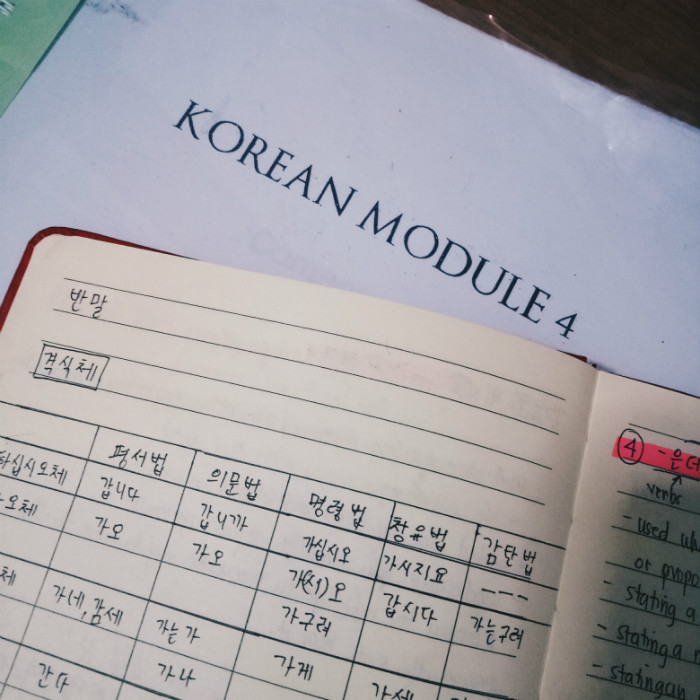View this article in another language
- 한국어
- English
- 日本語
- 中文
- العربية
- Español
- Français
- Deutsch
- Pусский
- Tiếng Việt
- Indonesian

Korea.net Honorary Reporter Diana Almarez introduces her way of studying Korean. (Diana Almarez)
By Korea.net Honorary Reporter Diana Kassandra A. Almarez from the Philippines
The wildly growing popularity of Korean pop music, TV shows and movies across East Asia and elsewhere, the so-called “Hallyu,” is dominating the Philippines, and even the world, mainly because of Korean soap operas being shown on local TV stations. So many people have been hooked on Korean soap operas and Korean pop music that people are starting to speak basic words of Korean itself and eventually learning even more of the Korean language.
I've been a fan of Korean pop music for nine years now, and that’s why I started to study Korean in 2013. I already finished Korean Module 1 through Korean Module 3 at the University of the Philippines Diliman –in the Department of Linguistics. I stopped studying over the past two years, but this year, I’m back and I’m on my fourth module at the moment at the same university.
Here are some tips to learning Korean a bit more effectively.
1. The most important resources you should have are the following.
• talktomeinkorean.com - This is where I started. They have 10 levels with 30 lessons in each level. I believe this is the most effective free online source for learning Korean because the lessons are separated strategically and, most importantly, it's free.
• Dictionary - I suggest you use either the online Daum or Naver dictionary. They both contain most of the information you need and the words are shown in context, and they are both free apps on your phone. They aren’t perfect, but there’re good places to start. You can also buy a physical dictionary from Tuttle Publishing and other dictionaries are available elsewhere. They provide some of the best printed language resources.
You're ready to go once you have those main resources above.
2. Learn basic phrases and expressions since these will be commonly used in conversation. Learn also about Korean heritage and traditions, and etiquette, too, to avoid showing disrespect. These are the basic necessities when travelling to Korea.
3. Study Hangeul, the Korean alphabet.
This alphabet is the writing system for the Korean language. Hangeul is not a translation for “the Korean language.” The Korean language in Korean is known as ”한국어” or Hangugeo.
Master the alphabet first. Learn the pronunciation before proceeding to the grammar lessons because almost all of the grammar lessons are in Hangeul, of course, especially when you move to the intermediate level.
4. Try converting Korean lyrics from Korean to English and vice versa. Make it a habit to read and write Hangeul so that it becomes easier. Listen to Korean pop songs or watch Korean movies or TV shows to familiarize yourself with the accents and pronunciation. Discover some Korean slang phrases that you can use in colloquial conversations.
5. Start grammar lessons at Talk to Me in Korean (talktomeinkorean.com). Listen to the audio first and then read the PDF files.
Constant practice is a must in language learning. Don't just focus on reading and writing, but focus on speaking as well. Speaking is very important in language learning. Languages are easier to remember when you speak them regularly, so find someone with whom you can talk or you can just practice by yourself.
6. Memorize five to 10 vocabulary words per day and use these in sentences. Try translating some Twitter comments from your favorite Korean artists and reply in Korean for practice. Take time to learn Korean. You can allot at least three hours every week and new vocabulary words every day when you don't have much time.
7. Go to formal classes to get certifications in your new skill and learn more. Going to formal classes is better than studying alone because you get to meet people with the same interests and it’s really better to have a study buddy where you can exchange ideas.
Here are some of the best language schools in the Philippines.
• The Korean Cultural Center in the Philippines -Mancor Corporate Building, 2/F 32nd St, Taguig, 1634 Metro Manila
• UP Diliman Extramural Classes - Department of Linguistics, Room 1325, Pavilion 1, Palma Hall, University of the Philippines, Diliman, Quezon City
• Ateneo de Manila University - Ateneo Center for Asian Studies, School of Social Sciences, Loyola School, Ateneo de Manila University, 2nd Floor, Ricardo and Dr. Rosita Leong Hall, Loyola Heights, Quezon City 1108
8. Lastly, take the Test of Proficiency in Korean (TOPIK). It has two types: TOPIK 1 for beginners, level 1 and 2, and TOPIK 2 for intermediate-advance learners, levels 3 to 6. This is the major certification you can get for Korean language, run by the Korean government. You can use it for work or school.
I hope you enjoy learning Korean and take that new skill to the next level. Be sure to engage in different Korean-focused events and activities.
wisdom117@korea.kr
* This article is written by a Korea.net Honorary Reporter. Our group of Honorary Reporters are from all around the world, and they share with Korea.net their love and passion for all things Korean.